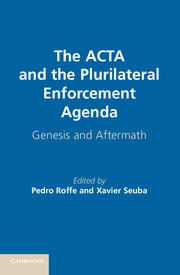Book contents
- Frontmatter
- Contents
- List of Contributors
- Foreword
- Acknowledgments
- Acronyms
- Introduction
- PART I THE FINAL ACT: ITS MAIN FEATURES AND CONTENTS
- PART II DOMESTIC LEGISLATIVE CHALLENGES
- PART III IMPACT ON RELATED PROCESSES
- 13 Three Steps Taken toward a Reinterpreted Three-Step Test
- 14 ACTA and the Future of Access to Knowledge in the Digital Environment
- 15 ACTA, East African Enforcement Legislation and Generic Medicines
- 16 The EU and Its IP Policies
- PART IV VIEWS FROM STAKEHOLDERS: LESSONS
- PART V WHAT LIES AHEAD ACTA
- Annex I Anti-Counterfeiting Trade Agreement
- References
- Index
- References
14 - ACTA and the Future of Access to Knowledge in the Digital Environment
US Enforcement Trends as a Global Predictor
Published online by Cambridge University Press: 05 December 2014
- Frontmatter
- Contents
- List of Contributors
- Foreword
- Acknowledgments
- Acronyms
- Introduction
- PART I THE FINAL ACT: ITS MAIN FEATURES AND CONTENTS
- PART II DOMESTIC LEGISLATIVE CHALLENGES
- PART III IMPACT ON RELATED PROCESSES
- 13 Three Steps Taken toward a Reinterpreted Three-Step Test
- 14 ACTA and the Future of Access to Knowledge in the Digital Environment
- 15 ACTA, East African Enforcement Legislation and Generic Medicines
- 16 The EU and Its IP Policies
- PART IV VIEWS FROM STAKEHOLDERS: LESSONS
- PART V WHAT LIES AHEAD ACTA
- Annex I Anti-Counterfeiting Trade Agreement
- References
- Index
- References
Summary
Introduction
This chapter considers ACTA’s impact on access to knowledge by focusing on two provisions that have the potential to undermine the public’s right to transmit and receive lawful information over the Internet. The first of these is the “cooperative efforts” provision in the section on enforcement in the digital environment. The second is the seizure provision in the section on civil enforcement. Neither provision appears on its face to threaten the public’s exercise of expressive rights on the Internet; however, recent enforcement trends in the United States foreshadow how each could be implemented to limit communicative freedom online, with little or no due process of law.
The cooperative efforts provision encourages the privatisation of online copyright enforcement pursuant to business agreements designed for the benefit of ISPs and copyright owners. Such agreements become binding on Internet users through terms of service drafted unilaterally by ISPs and presented to users on a “take it or leave it” basis. The contractual enforcement arrangements that result from cooperative efforts may displace flexibilities and consumer protections guaranteed under public law. When they do, Internet users will generally be left without judicial recourse because users formally consent to terms of service when they open their accounts.
- Type
- Chapter
- Information
- The ACTA and the Plurilateral Enforcement AgendaGenesis and Aftermath, pp. 236 - 243Publisher: Cambridge University PressPrint publication year: 2014



